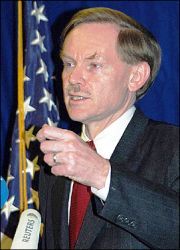Zoellick sees Sudan’s Darfur refugees, sketches steps to end crisis
By LIZ SIDOTI
EL FASHER, Sudan, Apr 16, 2005 (AP) — The U.S. State Department’s second-highest official saw part of the results of two years of bloodshed in Darfur — at least 80,000 homeless in one refugee camp alone — and laid out priorities for addressing Sudan’s crisis.

|
|
U.S. Deputy Secretary of State Robert Zoellick addresses a news conference in Khartoum Thursday, April 14, 2005. (AFP). |
“The near-term need is to try to ensure these people get food and water and basic supplies. Then you also have to provide the security for them,” said Robert Zoellick, who is the deputy of Secretary of State Condoleezza Rice.
The final step, Zoellick said, would be to “work on a political solution for the overall conflict and allow people to go back so they can return to their traditional lives in their villages.”
Closing his two-day trip to Sudan on Friday, Zoellick visited the dusty Abu-Shouk camp in the vast Darfur region for a firsthand look at the aftermath of the crisis that started in 2003.
That is when ethnic Africans rebelled over what they called discrimination by the Arab-dominated government, and government-aligned Arab militias fought back, committing atrocities. The United Nations says 180,000 people have died and 2 million people have been forced from their homes in Darfur, calling it the world’s worst humanitarian crisis.
Back in Washington, U.S. Senate Majority Leader Bill Frist stepped up pressure by urging the United Nations to recognize the killings in Darfur as genocide. Former U.S. Secretary of State Colin Powell last year labeled the atrocities genocide, but U.S. officials have avoided using the term since — including Zoellick on this trip.
“The Khartoum government will not stop this killing until it is faced with stiff international pressure,” Frist said on the Senate floor Friday. “Every day the world fails to act, Khartoum gets closer to its genocidal goal, and every day the world fails to act it compounds its shame.”
Genocide is a legal term meaning the intentional destruction of a national, ethnic, religious or racial group. As a signatory to a 1948 U.N. convention on genocide, the United States is committed to preventing the crime and punishing the perpetrators.
World leaders are often reluctant to use the term. At the time, Powell said no new action was dictated by his use of the word.
Over the past week in Sudan and Norway, Zoellick met with government officials, aid groups and the two men who brokered the peace deal that ended Sudan’s two-decade old civil war — Ali Osman Mohammed Taha, Sudan’s first vice president, and southern rebel leader John Garang.
Zoellick requested that the Khartoum-based government ease visa restrictions for foreign aid workers trying to get food to relief camps before planting season. He has pressed for the African Union to double its troops in Darfur, and asked leaders of the government and the rebels who opposed them in the civil war to halt raids on villages and relief caravans.
He also pushed for an inclusive process to address underlying conflicts between African tribes, the mostly Arab government, its allied militias and non-Arab rebels.
“The fundamental issue has to be trying to deal with the larger policy,” Zoellick said.
In a meeting with Zoellick Friday, Garang asked for immediate help and US$30 million (A?23 million) to start rebuilding the African country’s resource-rich south. Garang said he wants the aid to build roads, schools and communication systems as well as modernize the southern military.
“His key message actually was infrastructure,” Zoellick told reporters, “the basics to build the region.”
The United States has pledged US$1.7 billion (A?1.3 billion) for Sudan’s recovery, with much of the aid slated to ease the humanitarian crisis and begin reconstruction of the south. Congress has approved about half that amount.
